Table of Contents
- 1 Advanced Oxidation Process for Swimming Pool Sanitation: A Comprehensive Guide
- 2 What is the Advanced Oxidation Process (AOP)?
- 3 How AOP Works
- 4 AOP Interaction with Contaminants
- 5 Benefits of the Advanced Oxidation Process for Swimming Pools
- 6 Applications for Pools and Spas
- 7 Comparing AOP to Other Sanitation Methods
- 8 Implementing the Advanced Oxidation Process for Your Swimming Pool
- 9 Troubleshooting Common Issues
- 10 Advanced Oxidation Process Frequently Asked Questions (FAQs)
- 10.1 What is AOP, and how does it work in a swimming pool?
- 10.2 What kinds of contaminants can AOP remove that chlorine alone may miss?
- 10.3 Does AOP replace chlorine, or do I still need a residual sanitizer?
- 10.4 What are the main benefits of using an AOP pool sanitation system?
- 10.5 What maintenance is required for an AOP system compared to a traditional chlorine or salt system?
- 10.6 Are there downsides or limitations to AOP I should consider?
- 10.7 Can AOP reduce the need for chlorine, and how much chlorine reduction is realistic?
- 10.8 Is an AOP system a good fit for a typical Connecticut pool or similar residential setup?
- 10.9 How do I choose the right AOP system for my pool — what should I look for?
- 10.10 When should I consider adding AOP to my pool system — new build, retrofit, or only if I have problems?
- 11 Advanced Oxidation Process Leading Brands
- 12 Contact Us for AOP Systems
Advanced Oxidation Process for Swimming Pool Sanitation: A Comprehensive Guide
Maintaining clean, safe pool water is crucial to the health and enjoyment of swimmers. Traditional sanitation methods often fall short of delivering optimal results, leading to growing interest in more advanced solutions to maintain a sanitary, pristine pool.
One such cutting-edge technology is the Advanced Oxidation Process (AOP), which offers superior sanitation compared to conventional methods. This guide explores the benefits and applications of AOP in swimming pool sanitation.
What is the Advanced Oxidation Process (AOP)?
The Advanced Oxidation Process for swimming pools (AOP) is a water treatment method that uses powerful chemical reactions to eliminate contaminants in swimming pool water. It leverages advanced chemistry, particularly the generation of hydroxyl radicals, to purify swimming pool water. Historically, AOP has evolved from industrial applications to become a viable solution for residential and commercial swimming pool sanitation.
How AOP Works
The Advanced Oxidation Process (AOP) is a sophisticated water treatment method that relies on the generation of hydroxyl radicals, highly reactive molecules that break down and neutralize contaminants in swimming pool water. This process is highly effective because hydroxyl radicals are among the most potent oxidizing agents available. Understanding the chemistry behind AOP and how it works can provide insight into its effectiveness and advantages over traditional pool sanitation methods.
The Chemistry Behind AOP
The core of AOP’s effectiveness lies in the production and action of hydroxyl radicals (OH•). These radicals are incredibly reactive and can oxidize a wide variety of organic and inorganic pollutants, rendering them harmless. Here’s a closer look at the key components involved in generating these radicals:

Hydroxyl Radicals
Hydroxyl radicals are the primary agents in AOP, known for their strong oxidative properties. They have a high oxidation potential, enabling them to break down complex contaminants into simpler, non-toxic molecules. Hydroxyl radicals are short-lived but highly effective, reacting almost instantaneously with pollutants in the water.
These radicals can be produced using UV light, ozone, hydrogen peroxide, or a combination of these methods. The process involves a water-treatment cycle in which hydroxyl radicals interact with and neutralize pollutants, resulting in cleaner, safer swimming pool water.
Generation Methods
- UV Light: Ultraviolet (UV) light, specifically in the C-band spectrum (UV-C), is used to activate specific reactions that produce hydroxyl radicals. When UV light interacts with water and ozone, it initiates photolysis, generating hydroxyl radicals.
- Ozone (O3): Ozone is a powerful oxidant itself and is commonly used in AOP systems. It can be generated by passing oxygen through a corona discharge or exposing it to UV light. When ozone dissolves in water, it can react to form hydroxyl radicals, especially in the presence of UV light.
- Hydrogen Peroxide (H2O2): Hydrogen peroxide is another substance that can produce hydroxyl radicals when activated by UV light or combined with ozone. The reaction between hydrogen peroxide and UV light generates hydroxyl radicals, enhancing the oxidative process.
These methods can be used individually or in combination to maximize the production of hydroxyl radicals, ensuring thorough and effective water treatment.
The Process in Action
The practical application of AOP in swimming pools involves a carefully designed water treatment cycle that integrates these chemical reactions. Here’s a detailed step-by-step explanation of how the process works:

Water Treatment Cycle
- Introduction of Oxidants: The process begins by introducing ozone, hydrogen peroxide, or both into the pool water. These oxidants can be added directly to the water or generated on-site using specialized equipment.
- UV Activation: The water containing these oxidants is then exposed to UV-C light. This exposure occurs in a UV reactor chamber designed to ensure maximum interaction between the light and the water.
- Generation of Hydroxyl Radicals: In the UV reactor, UV light interacts with ozone and hydrogen peroxide, generating hydroxyl radicals. For instance, UV light breaks down ozone into oxygen and hydroxyl radicals, and it also splits hydrogen peroxide into water and hydroxyl radicals.
AOP Interaction with Contaminants
- Oxidation Reaction: Once formed, hydroxyl radicals rapidly react with contaminants present in the pool water. These reactions are highly efficient and can break down a wide range of pollutants, including organic matter (such as body oils and sweat), microorganisms (such as bacteria and viruses), and chemical residues (such as chloramines).
- Neutralization: Hydroxyl radicals oxidize contaminants, converting them into harmless byproducts such as water, carbon dioxide, and simple salts. This neutralization process ensures the pool water is free of harmful substances, thereby enhancing overall water quality.
- Continuous Treatment: The treated water is continuously circulated through the AOP system, maintaining a consistent level of cleanliness and safety. This ongoing process ensures the pool water remains sanitized at all times, even during peak usage.
The combination of these advanced chemical reactions and the continuous water-treatment cycle makes the advanced oxidation process for swimming pools an incredibly effective method for maintaining clean, safe swimming pool water. By leveraging the powerful oxidative properties of hydroxyl radicals, AOP systems provide superior pool sanitation compared to traditional methods.
Benefits of the Advanced Oxidation Process for Swimming Pools
The Advanced Oxidation Process (AOP) offers a wide range of benefits, making it an attractive option for pool owners seeking superior water quality and reduced maintenance. Here’s a detailed look at the primary advantages of implementing AOP in swimming pools:
Enhanced Water Quality
One of the most notable benefits of AOP is the significant improvement in water quality. The process results in crystal-clear water free from the typical chemical odors associated with traditional pool sanitizers. By effectively breaking down organic and inorganic contaminants, AOP ensures that the pool water remains pristine and inviting, providing a more enjoyable swimming experience.

Reduction of Harmful Byproducts
Traditional pool sanitizers, such as chlorine, can produce harmful byproducts, including chloramines, which can cause skin and eye irritation and contribute to unpleasant chemical odors. AOP minimizes the formation of these byproducts by using hydroxyl radicals to oxidize contaminants. This reduction in harmful byproducts creates a safer, more pleasant swimming environment.
Improved Safety and Health Benefits
AOP systems significantly enhance the safety and health benefits for swimmers. By reducing the presence of chloramines and other harmful substances, AOP helps to decrease skin and eye irritation. Swimmers can enjoy a more comfortable, irritation-free experience, especially beneficial for those with sensitive skin or allergies.
Reduced Dependence on Traditional Chemicals
One of the standout advantages of AOP is its ability to lower the reliance on traditional pool chemicals like chlorine. By providing adequate sanitation through hydroxyl radicals, AOP reduces the need for large quantities of chlorine and other chemicals. This reduction simplifies pool maintenance, as pool owners spend less time balancing chemical levels and dealing with chemical-related issues.

Environmental Benefits
AOP offers significant environmental benefits, making it a greener choice for pool sanitation. The process decreases chemical waste and reduces the overall ecological footprint of maintaining a pool. By minimizing the use of traditional chemicals, AOP promotes a more sustainable approach to pool management, aligning with the growing demand for eco-friendly solutions.
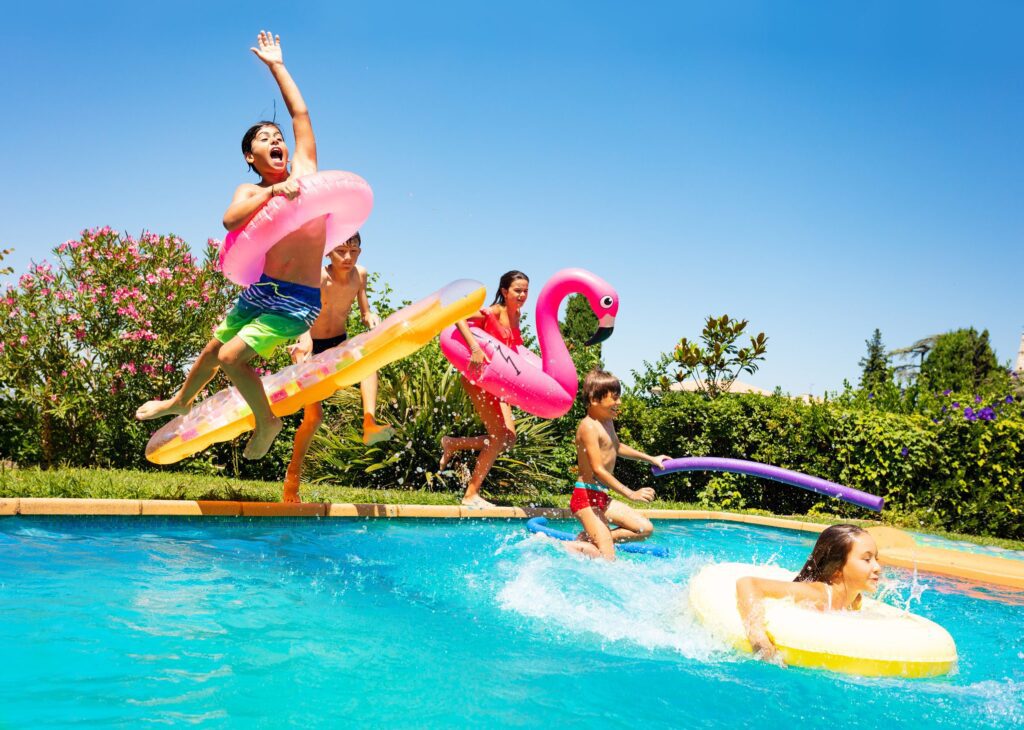
Additional Benefits
- Cost Savings: Over time, reduced chemical use can lead to cost savings for pool owners. While the initial investment in an AOP system may be higher, the long-term savings on chemicals and maintenance can offset these costs.
- Ease of Maintenance: AOP systems are designed to operate with minimal intervention. Automated monitoring and control features ensure the system runs efficiently, reducing the need for frequent manual adjustments and maintenance.
- Enhanced Swimming Experience: The combination of crystal-clear water, reduced chemical exposure, and improved safety creates an overall enhanced swimming experience. Pool owners and their guests can enjoy a cleaner, healthier, and more enjoyable pool environment.
Implementing AOP in your swimming pool is a wise investment that offers numerous benefits. From improved water quality to environmental advantages, AOP provides a comprehensive solution for modern pool sanitation.
Applications for Pools and Spas
The versatility of Advanced Oxidation Process (AOP) systems makes them suitable for a wide range of applications, from residential pools to commercial facilities and spas. Here’s how AOP can enhance various types of aquatic environments:
Residential Swimming Pools
For homeowners, AOP systems significantly enhance water quality while reducing maintenance efforts. By effectively breaking down contaminants and reducing the need for traditional chemicals, AOP ensures a cleaner, safer swimming environment, providing a more enjoyable swimming experience for the whole family.

Commercial Swimming Pools
In commercial settings, such as public pools, hotels, and resorts, AOP systems offer a reliable and efficient sanitation solution. These systems can handle large volumes of water and high bather loads, ensuring consistently high water quality. The reduction of harmful byproducts and improved safety make AOP an attractive option for pool operators seeking to enhance their guests’ overall experience.
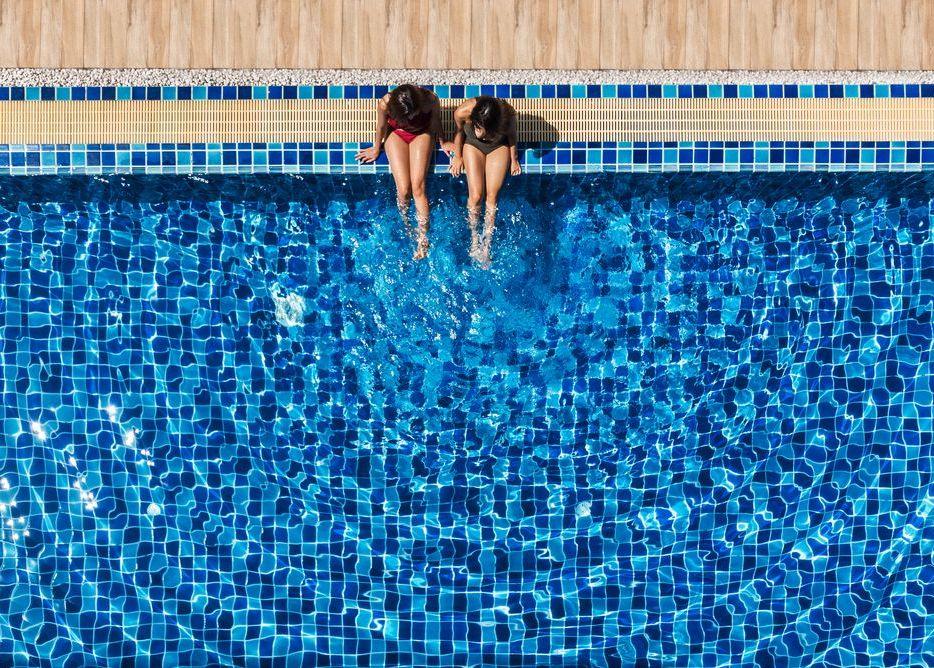
Spas and Hot Tubs
AOP systems are particularly beneficial for spas and hot tubs, where maintaining high water quality is crucial due to the smaller water volume and higher temperatures. AOP reduces chemical exposure, providing a more pleasant and healthier experience for users. The technology also helps maintain clear water and reduce unpleasant odors, which are common issues in spa and hot tub environments.
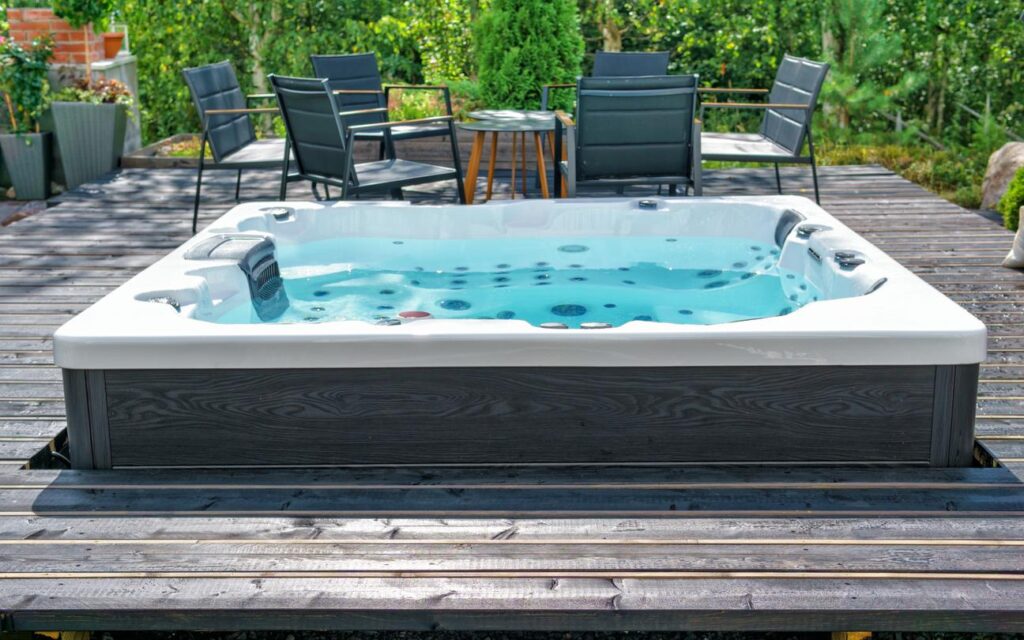
Specific Use Cases
AOP systems are especially advantageous for indoor pools, where they improve air quality by reducing volatile organic compounds (VOCs) and other harmful byproducts. Reducing VOCs is particularly important in enclosed spaces where poor air quality can lead to respiratory issues and other health problems. By ensuring better air and water quality, AOP enhances the overall indoor pool environment.
Comparing AOP to Other Sanitation Methods
AOP vs. Chlorine
Effectiveness
The advanced oxidation process for swimming pools is more effective than chlorine in removing a broader range of contaminants. While chlorine is excellent at killing bacteria and viruses, AOP goes further by breaking down organic and inorganic pollutants that chlorine may not fully address.
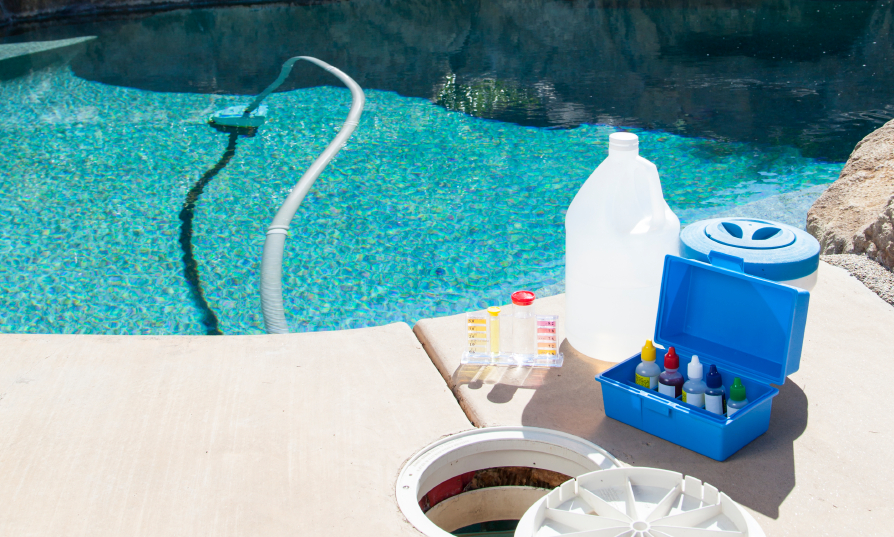
Health and Safety
AOP reduces the formation of harmful byproducts, such as chloramines, which can cause skin and eye irritation and respiratory issues. This leads to a safer swimming environment with reduced health risks from chemical exposure.
Cost Implications
Although the initial cost of installing an AOP system can be higher than that of a traditional chlorine system, the long-term savings on chemicals and reduced maintenance can offset this investment. Pool owners often find that the improved water quality and reduced chemical use justify the upfront expense.
Environmental Impact
AOP is more environmentally friendly than chlorine-based systems, as it significantly reduces chemical waste and lowers the environmental footprint of pool maintenance, making AOP an attractive option for eco-conscious pool owners.
AOP vs. Saltwater Systems
Operational Differences
Saltwater systems generate chlorine through the electrolysis of salt, while AOP uses hydroxyl radicals to sanitize the water. AOP provides a more advanced and effective method of contaminant removal.
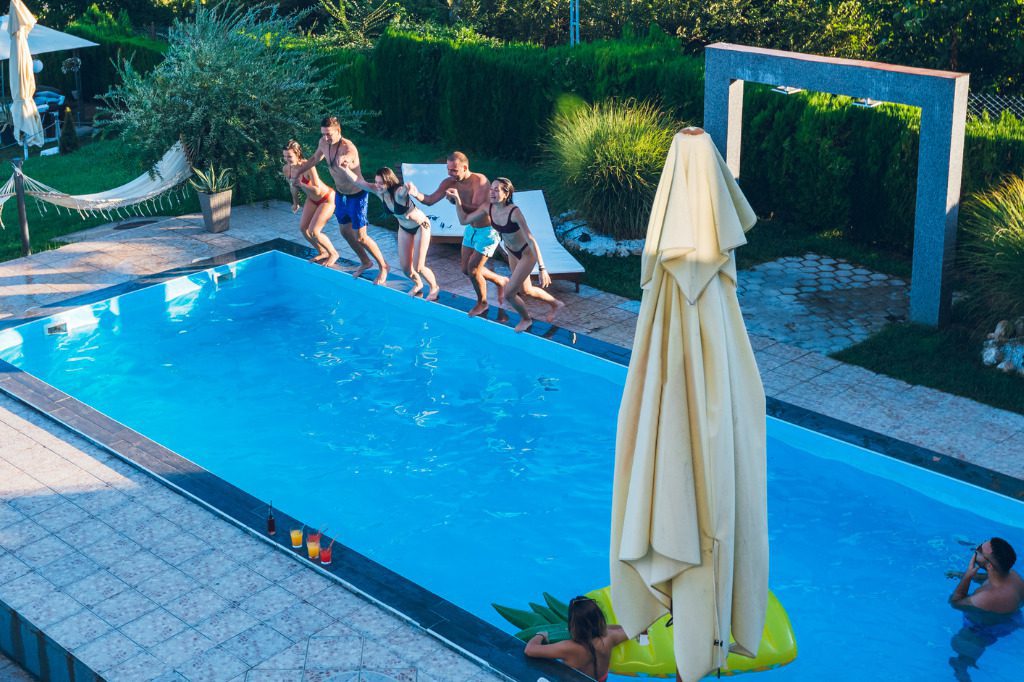
Maintenance Requirements
AOP systems generally require less maintenance than saltwater systems, which require regular monitoring and salt-cell cleaning. AOP’s automated processes simplify maintenance, making it a more convenient option for pool owners.
Pros and Cons
AOP delivers superior water quality with fewer chemicals, resulting in a more pleasant swimming experience. However, saltwater systems are easier to convert from traditional chlorine pools and can be less expensive initially. Each system has its advantages, but AOP offers a more comprehensive, low-maintenance solution.
AOP vs. UV Sanitization
Mechanisms of Action
UV sanitization uses ultraviolet light to kill microorganisms. In contrast, AOP uses chemical reactions involving hydroxyl radicals to break down a broader range of contaminants, providing a more thorough sanitation method.
Efficiency and Reliability
AOP is more comprehensive in contaminant removal compared to UV systems, which are primarily effective against bacteria and viruses. AOP’s ability to address a broader spectrum of pollutants makes it a more reliable option for maintaining high water quality.
Use Cases and Limitations
UV systems are adequate but limited to microbial control. They do not address organic and inorganic pollutants as effectively as AOP. Therefore, AOP is better suited for pools that require comprehensive water treatment.
AOP vs. Ozone Sanitization
Advanced Oxidation Process for swimming pools provides more thorough sanitation by combining the oxidizing power of ozone with the additional generation of hydroxyl radicals. This dual action makes AOP more effective than ozone alone.

Comparative Effectiveness
Advanced Oxidation Process for swimming pools provides more thorough sanitation by combining the oxidizing power of ozone with the additional generation of hydroxyl radicals. This dual action makes AOP more effective than ozone alone.
Safety and Operational Considerations
Both AOP and ozone systems are safe, but AOP offers enhanced performance and efficiency. AOP systems are designed to maximize the generation and utilization of hydroxyl radicals, ensuring optimal water quality.
Integration with Existing Systems
AOP can be easily integrated with existing pool systems, enhancing their overall performance. This flexibility makes it a practical choice for pool owners looking to upgrade their sanitation methods without completely overhauling their current setup.
Implementing the Advanced Oxidation Process for Your Swimming Pool
Choosing the Right AOP System
Selecting the appropriate AOP system for your pool involves several key considerations. Factors such as pool size, usage frequency, and budget play crucial roles in determining the best system for your needs. Here’s how to make an informed decision:
- Pool Size: Larger pools require more robust AOP systems capable of handling greater water volumes. Ensure the system you choose is rated for your pool’s capacity.
- Usage Frequency: Pools that see heavy usage will benefit from more advanced systems with higher treatment capacities. Consider how often your pool is used and how many people use it.
- Budget: While AOP systems can be an investment, they offer long-term savings on chemical costs and maintenance. Determine your budget and compare different systems within that range.
Consulting with a pool professional at The Swimming Pool Store can provide valuable insights and help you select a system that meets your specific requirements. We can assess your pool and recommend the best AOP solution based on your unique situation.
Installation Process
The installation of an AOP system can be handled either by a professional or as a DIY project, depending on your technical skills and comfort level with pool equipment. Here’s what to consider:
- Professional Installation: Hiring a professional ensures that the system is installed correctly and efficiently. Professionals have the expertise to integrate the AOP system with your existing pool infrastructure, ensuring optimal performance and longevity.
- DIY Installation: If you have experience with pool maintenance and are comfortable with the technical aspects, you can install the system yourself. Detailed instructions are typically provided with the system, and some manufacturers offer support for DIY installations.
Proper installation is critical for the effective operation of the AOP system. Follow all guidelines carefully to ensure the system functions as intended.
Maintenance and Operational Guidelines
Regular maintenance is essential to keep your AOP system running efficiently and to prolong its lifespan. Here are some key maintenance tasks for the Advanced Oxidation Process for swimming pools:
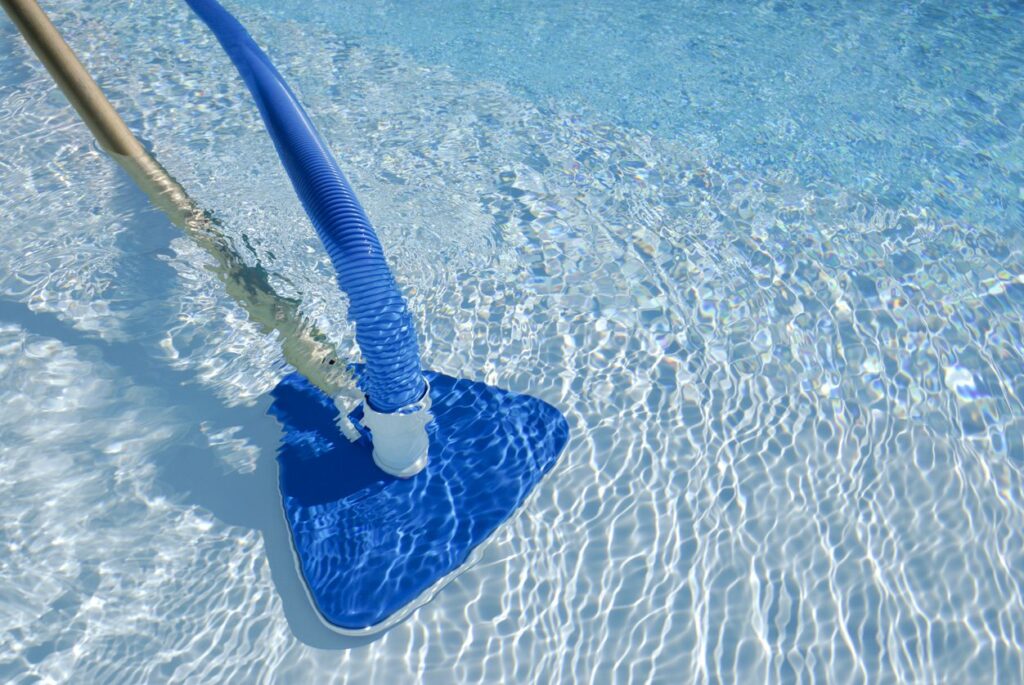
- System Checks: Regularly inspect the system components, including the UV lamps, ozone generators, and pumps, to ensure they are functioning correctly.
- Component Replacement: Replace any worn-out parts, such as UV lamps or filters, as needed. Most components have a recommended replacement schedule provided by the manufacturer.
- Cleaning: Keep the system clean and free of debris, including periodic cleaning of the UV reactor chamber and other critical parts.
Following these guidelines will help maintain the system’s efficiency and effectiveness, ensuring consistently high water quality.
Troubleshooting Common Issues
Despite regular maintenance, you may encounter issues with your AOP system. Here are some common problems and troubleshooting tips:
- Reduced Performance: If the system is not performing optimally, check for any blocked or dirty components, and ensure all parts are in good condition. Replacing worn-out UV lamps or filters can often resolve performance issues.
- Mechanical Failures: Mechanical failures can occur due to wear and tear or improper maintenance. Consult the manufacturer’s troubleshooting guide and seek professional support if needed.
- Water Quality Issues: If the water quality deteriorates, verify that the system is running as scheduled and that all chemical levels are balanced. Regular water testing can help identify and address any underlying issues.
Having access to professional support can be invaluable when troubleshooting complex problems, ensuring your AOP system continues to operate effectively.
Advanced Oxidation Process Frequently Asked Questions (FAQs)
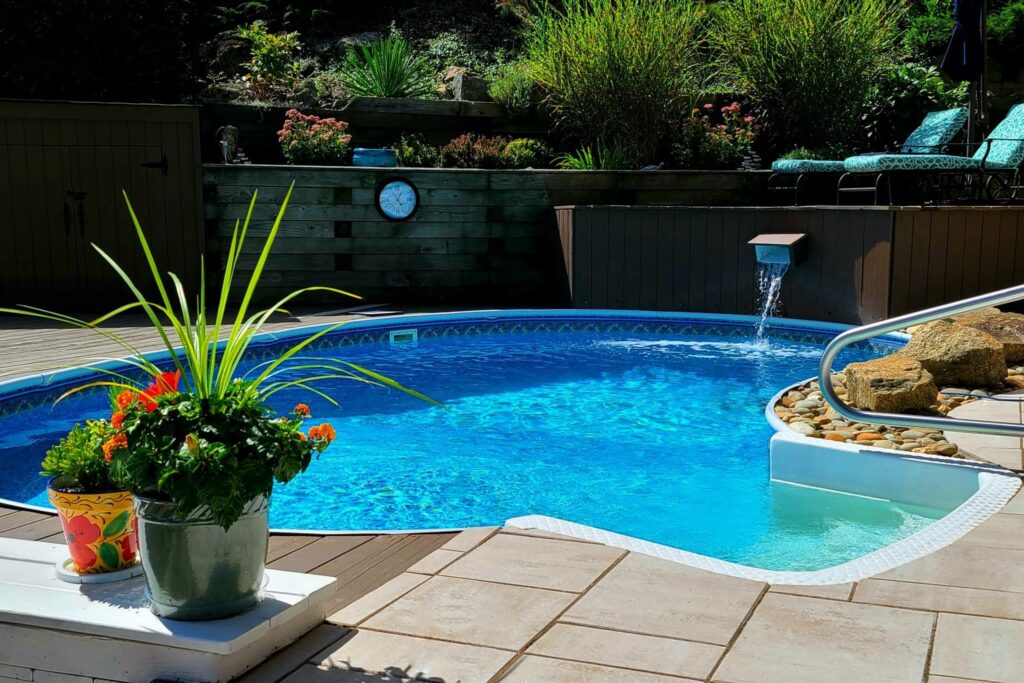
What is AOP, and how does it work in a swimming pool?
An AOP system uses a combination of oxidizers — often UV light, ozone, and/or other treatments- to generate hydroxyl radicals (·OH) that rapidly neutralize contaminants in pool water. These radicals are among the most powerful oxidizers used in water treatment, and they work faster and more thoroughly than standard sanitizers.
In simple terms, water is circulated through a specialized AOP reactor after filtration. Inside, the system uses UV and/or ozone (or other oxidizer methods, depending on the design) to generate hydroxyl radicals. These radicals immediately attack and break down organic matter, bacteria, chloramines, and many other pollutants — resulting in cleaner, clearer water without relying solely on chlorine or other traditional sanitizers.
What kinds of contaminants can AOP remove that chlorine alone may miss?
AOP oxidizes both organic and inorganic impurities—such as oils, lotions, body residues, chloramines, biofilm precursors, and microscopic organics. Many of these are managed slowly or poorly by chlorine alone.
Because hydroxyl radicals react rapidly and with many substances, AOP helps clean water of contaminants that cause cloudiness, odors, irritation, and lingering organics. The result is pool water that looks clearer, smells fresher, and feels more natural compared to typical chlorine treatment.
Does AOP replace chlorine, or do I still need a residual sanitizer?
AOP significantly reduces the burden on chlorine, but in most residential pools, it does not eliminate the need for a residual sanitizer such as chlorine. Hydroxyl radicals oxidize contaminants during circulation, but they do not remain in the water — they react immediately and disappear.
You still need to maintain a low level of free chlorine (or another residual sanitizer) for ongoing protection between circulation cycles—especially against bacteria or pathogens reintroduced by swimmers or the environment. Many AOP systems operate with reduced chlorine levels, combining the oxidation power of AOP with chlorine’s residual protection.
What are the main benefits of using an AOP pool sanitation system?
AOP more thoroughly breaks down contaminants, produces clearer, softer-feeling water, reduces chemical byproducts, and lowers chlorine use, making pool water gentler and lowering long-term chemical costs.
AOP extends water clarity, reduces odors, and lessens irritation. The water may feel closer to fresh water, which benefits sensitive people or those who swim frequently.
What maintenance is required for an AOP system compared to a traditional chlorine or salt system?
AOP systems typically require less frequent chemical handling than traditional chlorine or salt-chlorine systems — but they do have maintenance needs that should be adhered to. That includes periodic inspection and cleaning of the AOP reactor (e.g., UV lamp replacement, if applicable; ozone generator check; or other system-specific maintenance), regular water chemistry balance, and monitoring of circulation flow.
Modern hydroxyl-based AOP systems require only minimal maintenance, generally limited to annual or semiannual checks and routine pool chemistry tests, making them attractive to homeowners seeking less upkeep without compromising water quality.
Are there downsides or limitations to AOP I should consider?
Yes — while AOP is powerful, it’s not a perfect substitute. Because hydroxyl radicals dissipate immediately after they react, AOP does not provide a lasting sanitizer residual on its own. Without a supplemental residual sanitizer (such as chlorine), water quality could decline between circulation cycles, especially with heavy swimmer loads or environmental contamination.
Also, the effectiveness of AOP depends heavily on proper system design, circulation flow, and consistent maintenance. If the reactor is improperly sized, water flow is insufficient, or chemistry is neglected, the benefits of AOP can diminish. And because the technology tends to be more complex than a simple chlorine or salt system, installation and upfront cost may be higher, which homeowners should weigh against long-term benefits.
Can AOP reduce the need for chlorine, and how much chlorine reduction is realistic?
Yes — many users of AOP systems report substantial reductions in required chlorine levels once the system is installed correctly and maintained. By using hydroxyl radicals to oxidize contaminants and break down chloramines, AOP reduces chlorine demand, allowing you to run pools with lower free chlorine levels than a conventional system would require.
However, AOP doesn’t eliminate the need for chlorine. Even with AOP, a minimal residual sanitizer remains necessary. But by combining AOP with reduced chlorine output, you can often achieve a balance that delivers clean, comfortable water while minimizing chemical exposure and expense, which many owners find a valuable trade-off for the increased water quality and comfort.
Is an AOP system a good fit for a typical Connecticut pool or similar residential setup?
AOP works well for residential pools in seasonal regions like Connecticut, maintaining water quality, reducing chemical handling, and improving comfort when paired with suitable circulation equipment.
Because AOP doesn’t require constant manual chemical addition once it’s up and running, it can be especially appealing for seasonal pool owners who want reliable water quality without an ongoing maintenance burden. Combined with regular winterization and spring start-up service, AOP offers a solid balance of performance and convenience for typical Northeastern pool owners.
How do I choose the right AOP system for my pool — what should I look for?
When selecting an AOP system, you’ll want to consider several key factors: pool volume and circulation capacity, system compatibility with existing plumbing and filter equipment, ease of maintenance, and whether the system uses hydroxyl-based oxidation or a UV/ozone hybrid. A proper fit ensures the AOP reactor treats all pool water efficiently as it circulates.
It’s best to choose models from reliable manufacturers with good support and easy maintenance. The right AOP system should fit smoothly into your pool’s pump and filter, and your pool service provider should confirm that water flow and turnover are optimized for treatment.
When should I consider adding AOP to my pool system — new build, retrofit, or only if I have problems?
Consider AOP in a new build, major upgrade, or if experiencing ongoing water quality problems with standard systems, such as recurring chloramine odors or algae.
For owners with chlorine or salt pools wanting less chemical use and better water quality, AOP is a practical retrofit—if combined with strong circulation and steady upkeep. For new pools or major renovations, installing AOP from the beginning can reduce ongoing maintenance and enhance comfort.
Advanced Oxidation Process Leading Brands
Hayward HydraPure
Hayward HydraPure represents a pinnacle of innovation in the pool industry, reflecting Hayward’s commitment to quality and advanced technology. The HydraPure AOP system leverages the synergy between UV and ozone technologies to deliver superior water sanitation.
Overview:
Hayward is a well-established brand in the pool industry, renowned for its innovative and high-quality pool equipment. The HydraPure AOP system exemplifies this reputation, combining advanced technologies to enhance water clarity and purity.
HydraPure AOP System:
Key Features:
- Combination of UV and Ozone Technologies: HydraPure uses both UV light and ozone to produce hydroxyl radicals, which are highly effective at oxidizing and eliminating contaminants in pool water.
- Enhanced Water Clarity: The dual-action system keeps water crystal clear by breaking down organic and inorganic pollutants.
- Continuous Sanitation: HydraPure continuously sanitizes the pool water, reducing the reliance on traditional chemicals and ensuring a safer swimming environment.
Benefits:
- Reduced Need for Traditional Chemicals: By generating powerful oxidants, the system minimizes the need for chlorine and other sanitizing chemicals.
- Minimizes Chloramine Formation: Chloramines, which can cause eye and skin irritation, are broken down more effectively, leading to a more pleasant swimming experience.
- Adequate Water Sanitation: The combination of UV and ozone technologies ensures continuous, thorough sanitation, keeping water safe and clean.
Applications:
- Residential Pools: Ideal for homeowners seeking enhanced water quality and reduced chemical usage.
- Commercial Pools: Suitable for public pools, hotels, and resorts, offering a robust and reliable sanitation solution that can handle high bather loads.
Clear Comfort CCW100 AOP System
Clear Comfort CCW100 AOP System stands out as a leader in advanced pool and spa water treatment solutions. Known for its sustainability and user-friendly designs, Clear Comfort offers cutting-edge technology with its CCW100 system.
Overview:
Clear Comfort is recognized for its pioneering work in the pool and spa industry, delivering sustainable and user-friendly water treatment solutions. The CCW100 AOP system utilizes a patented process to provide superior water quality with minimal maintenance.
CCW100 AOP System:
Key Features:
- Patented Hydroxyl-Based AOP: The CCW100 system uses a unique hydroxyl-based advanced oxidation process that efficiently eliminates contaminants.
- Chlorine-Free Operation: This system can operate without traditional chlorine, significantly reducing chemical use and maintenance requirements.
- User-Friendly Design: Designed for easy installation and operation, making it accessible for pool owners of all experience levels.
Benefits:
- Crystal-Clear Water: The advanced oxidation process keeps pool water exceptionally clear, enhancing the swimming experience.
- Reduced Chemical Odors and Irritation: By eliminating the need for chlorine, the system reduces unpleasant chemical odors and minimizes skin and eye irritation.
- Healthier Swimming Environment: The CCW100 creates a safer and healthier pool environment by effectively removing contaminants without harsh chemicals.
Applications:
- Residential Pools: Perfect for homeowners looking for a low-maintenance, high-efficiency sanitation solution.
- Spas and Hot Tubs: Ensures superior water quality in smaller, more intimate settings.
- Small Commercial Pools: Suitable for smaller commercial operations, offering easy installation and low maintenance.

Contact Us for AOP Systems
Let The Swimming Pool Store help you find the perfect AOP solution for your pool. Contact us today to learn more about the Hayward HydraPure and Clear Comfort CCW100 systems and how they can transform your swimming experience. We hope this detailed guide to the advanced oxidation process for pools has answered all your questions about this superior sanitation system.
The Swimming Pool Store offers more than 55 years of experience in the swimming pool business. We are familiar with all methods of pool sanitation and fully embrace the latest in swimming pool technology. Contact us to learn more about maintaining a pristine, sanitary pool and the advanced oxidation process for swimming pools.
